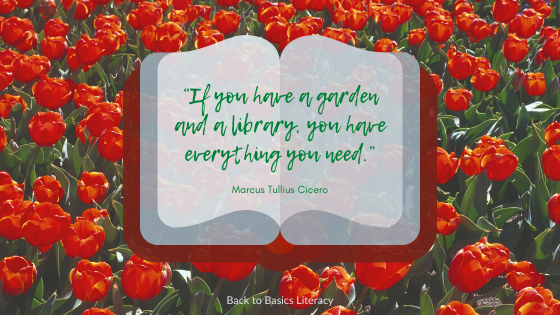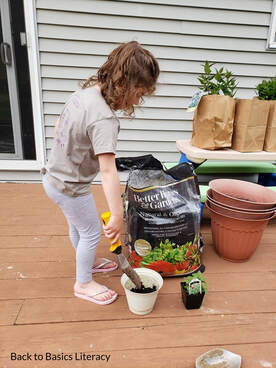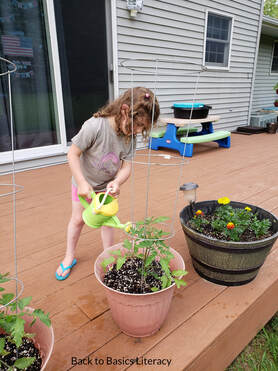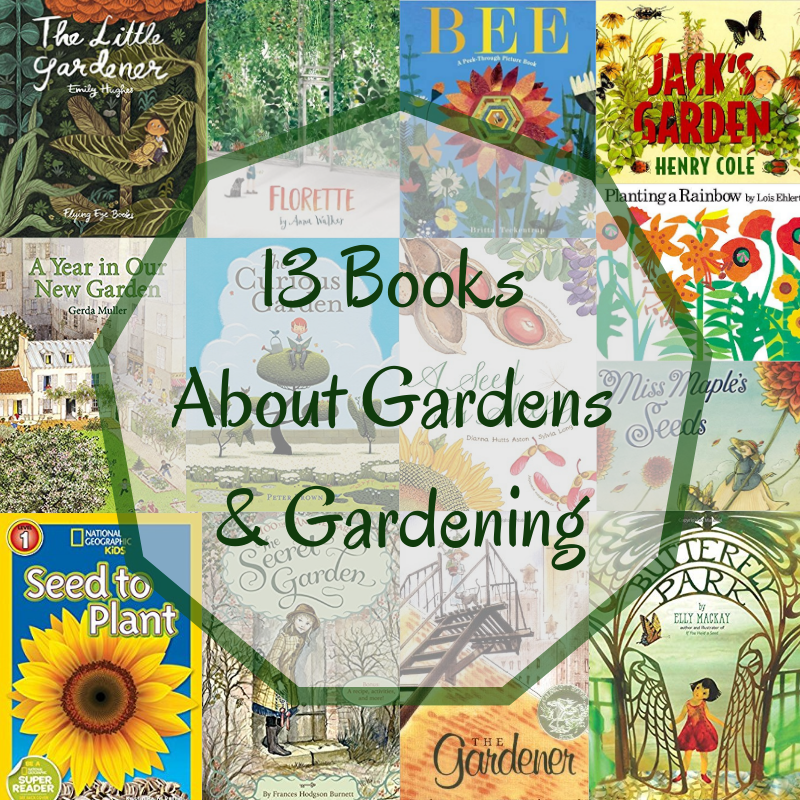|
*Note: this post contains Amazon Affiliate links. Any purchases made via the links provided go to support our literacy efforts.
That quote says it all. A garden, whether it be a flower garden or a vegetable garden, is an amazing place to sit and read a book surrounded by the sounds of nature, especially if you and your child were the ones to plant and care for said garden. We previously discussed the joy of flower gardens and now we wish to move on to the joy and educational benefits of planting a vegetable garden and partaking of the fruits of your labors.
Research has shown that when children participate in growing edible plants, they are more apt to try not only the fruits and vegetables they grow but also other fruits and vegetables. Helping to plan, plant and tend a garden not only develops life skills but also helps foster responsibility, independence, leadership, caring, teamwork and problem solving. Most children today, especially city dwellers, are unaware of where their food comes from or what it takes to grow food. Visiting your local farmers market is a start but actually growing the food you will serve will cultivate a relationship to the natural world, which in turn will help your child to wisely make future decisions that could impact nature, becoming a wise steward.
The benefits of gardening include:
Before beginning a garden, involve your child(ren) in the planning, such as where the garden will be located, how large it will be and what you will grow. If you have more than one child and they are old enough to handle chores on their own, either assign tasks, write them on cards and draw them out of a watering can or make a spinning wheel where children spin for their task. For younger children, work side-by-side to model proper technique and let them assist with the planting, weeding, watering etc. A great book to share might be Roots, Shoots, Buckets and Boots by Sharon Lovejoy.
Though this is important work and will help to feed the family, keep it fun. Plan raised garden beds in different shapes and sizes. Have children use their math and building skills to measure out and build planter boxes. Another idea is to plant a pizza garden in the shape of a wheel where each slice has a different pizza ingredient planted, such as tomatoes, peppers, onions, spinach or even herbs. If you don‘t have space for a large garden, use planters on a patio or deck to grow a salad or grow herbs indoors and use them when cooking meals. Throughout the season, have children help harvest the vegetables and also help decide what to do with all the produce. Ideas can include pickling, canning, freezing, fresh salsas and using them in baked goods.
Growing a garden, both flowers and fruits & vegetables is an excellent way to incorporate educational lessons without your children feeling like they are doing work that will be tested at the end. We have found that when children understand why they are doing something and then are given the responsibility to complete the task, they will surprise you and step up to the plate. Remember to have age appropriate expectations but there is nothing wrong with offering more difficult tasks and working together to complete them.
To read more about the benefits of gardening with kids and see lists of our favorite gardening books, refer back to our previous blogs:
Happy gardening and reading!
-Kate @ BTBL Author
We are three generations that seek a way to get back to basics. It’s not that we eschew technology, but sometimes simpler is better, especially in raising our children. Mom was a reading teacher, Amanda is an early childhood educator and Kate a children’s literature specialist and former school librarian along with the latest additions, a daughter (now 4) for Kate, and two sons (now 1 and a newborn) for Amanda. We advocate reading aloud, the simple toys that use imagination and encourage creativity and learning in the kitchen, which can be a fun mess but also teaches life skills. Join us in raising healthy, happy, inquisitive and intelligent children.
0 Comments
Leave a Reply. |
AuthorWe are mom Sandra and daughters Amanda and Kate, all with backgrounds in literacy and education, who want to share our philosophy of taking the basics of life; books, simple toys that encourage play, imagination and creativity, and using cooking and baking to teach math and real life skills to raise happy, inquisitive children. Join us in exploring the old and the new and sifting through the myriad of research to consider what is best for our children. Archives
June 2022
Categories
All
|





 RSS Feed
RSS Feed